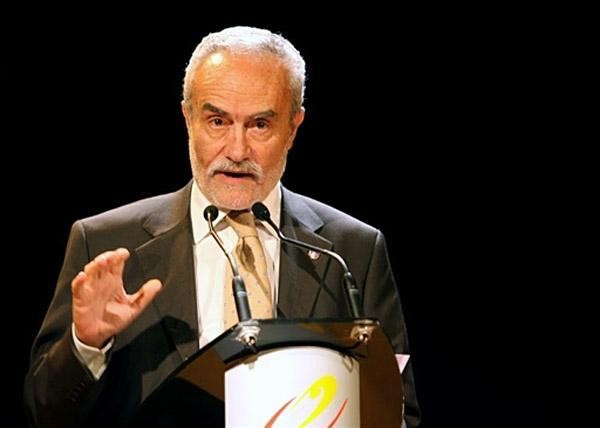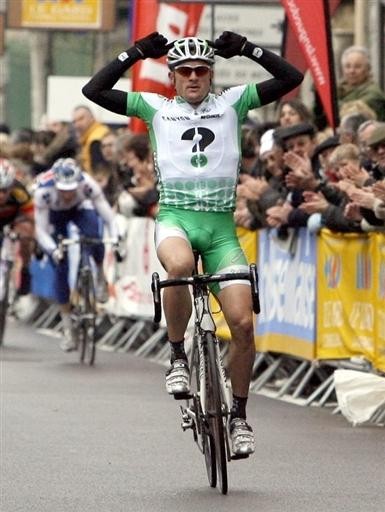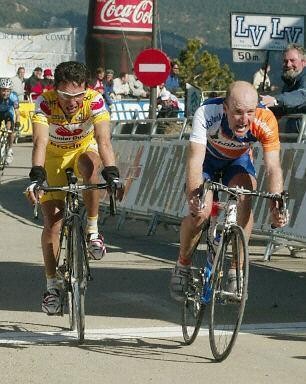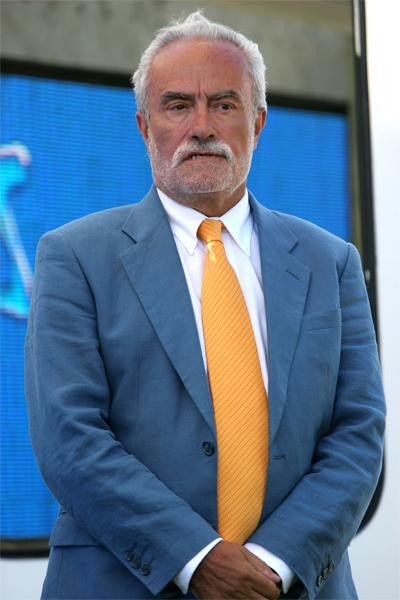The ProTour issue through Unipublic's eyes
As the Vuelta a España's director, Victor Cordero is among the most powerful men in world cycling....




An interview with Victor Cordero, March 14, 2007
After teetering on the brink of implosion the UCI think-tank's ProTour is gradually stepping back from the edge as cycling's governing body and the Grand Tour organisers compromise on a solution to the three year-old battle. Cyclingnews' Hernan Alvarez spoke with Unipublic's Victor Cordero to discuss the needs, problems and possible solutions of the ProTour issue.
As the Vuelta a España's director, Victor Cordero is among the most powerful men in world cycling. While the Spanish tour sits clearly behind the Tour de France and Giro d'Italia in status, Unipublic's position in the Grand Tour alliance is unquestionably one of influence.
In February Unipublic stood behind Tour de France organiser ASO in its refusal to allow Unibet.com to compete in its Grand Tour. Just over a month later, the message is still the same, although the line had softened subtly.
"Unibet is not in our plans, but fortunately, as we are not forced by the rules to give the wildcards on March 1 like last year, we can wait up to three months, until the end of May, begin of June [before we decide]. The last word it is not yet said," noted Cordero. "If Unibet has all its legal problems solved, if it improves the performances and conditions of the other six candidates…it is not Unibet alone, we have six candidatures for riding the Vuelta a España. We will make the decision mainly based on sporting criteria. Up to today, I don't see Unibet in the Vuelta."
Cordero went on to outline the outcomes of last week's emergency meeting between the Grand Tour organisers, the UCI and IPCT in Brussels, saying: "What we have decided last Monday is that our 18-team offer, that the 18 teams have accepted, is still valid. Astana as well as Unibet go to the races with wildcards. They are wildcards, race organisers are free to decide about them."
The director was quick to point out that the only wildcard Unipublic has confirmed for the Vuelta is that given to Astana. Cordero maintained that Astana was issued a wildcard solely on the basis of it being the reigning event champions: having won last year's edition with Alexandre Vinokourov.
Get The Leadout Newsletter
The latest race content, interviews, features, reviews and expert buying guides, direct to your inbox!
While there are seven teams battling for the maximum of three remaining wildcards, Cordero warns that he is aiming to have only two more wildcards at this year's Vuelta - lessening the likelihood of Unibet gaining a slot.
"We want to give solely two because we want to start the race with 21 teams," he revealed. "Logically, I know that we will have pressure for having 22 teams: helping another one of the seven candidates. The decision will be based in two items: sporting results and the way things are done. It should be seen that it is a team [the chosen] that goes with a clear concept in cycling and with future plans. Besides, we will bring among the invited [teams] the ones that can guarantee good shows."
Cordero believes the situation that arose with Unibet was inevitable, given that the UCI granted it a ProTour licence after the Grand Tour organisers had declared it would only invite the 18 squads that met the governing body's original deadline for licence applications. The Spaniard also questioned how much consideration was given to the legal issues presented by an online gambling sponsor such as Unibet.
"The legislation in most of the European countries prevents the presence of one [Unibet] of the teams that the UCI license commission gave a license after this decision of ours," explained the Spaniard. "Maybe someone took the legal problems about the sponsor Unibet has too lightly? There are some countries where that advertising is illegal."
While Unibet's position in the ProTour will continue to unfold over the coming weeks, with Giro d'Italia ograniser RCS Sport announcing today it would invite the squad to Milano-Sanremo, Cordero last Monday's meeting: haling it as a positive step towards a resolution between the Grand Tour organisers and the ProTour.
"I think it is important to highlight that it is the first time the three parts discuss with the president [Pat] McQuaid and we couldn't ask him for more. It was the first time and there is already a signed document and an agreement," he noted. "Up to that moment, we hadn't had a meeting with McQuaid, there had been meetings with interposed persons and we hadn't fixed any problem.
"From that point of view, I think it will be a very important message to cycling: that Mr McQuaid recovers his regulator role of the whole cycling family," added Cordero. "He already did it with diplomacy and capability as he did on Monday, [March 5]."
It's clearly that regulator roll which Cordero considers vital for McQuaid to maintain in order for the concerned parties to continue working towards a suitable resolution for all to the ProTour issue.
"We were very close to [a complete fraction from the UCI]," warned Cordero. "I think the first one who realised that, and assumed his responsibility to avoid it, has been the UCI president Mr McQuaid. As long as McQuaid keeps on being open to discussion and assumes his regulator role, because the UCI had lost its regulator role as it was part [of the conflict], a division will be every day further away."
While the Grand Tour organiser's distain for the ProTour has been a well versed fact since its inception, Cordero didn't hold back when queried about the topic.
"No, I am convinced that it is not useful. The ProTour idea, the best teams in the best races and also the best riders in the best teams, is an idea we can all share. What is the problem? That the idea dies there," stated Cordero. "It doesn't maintain the concept of the pyramid cycling had. Cycling starts down in the lower categories and goes up in a pyramid where the best team in the world and the best race in the world will be at the summit. There it is: the Tour de France."
"The ProTour changed cycling from the pyramid figure to a high tree with a leafy and beautiful crown where they are the best," explained Cordero. "But in this tree, the crown is every time further in the ground and the roots are smaller. As far as I'm concerned, representing Spain and as president of the world organizers association, I am able to say that there are races with a very long tradition that are dying. In the professional category, the number of teams has decreased and so did the number of races."
It's this decline in what is one of the world's most popular sports that troubles Cordero. The Spaniard supported his claims with an example of an event that, in his eyes, has been crushed by the ProTour concept.
"I give you one name of a Spanish race that is Setmana Catalana. This race has, among its winners not once but many times, riders like Eddie Merckx or Luis Ocaña just to name two," he noted. "It is a long tradition race: a race that had UCI's maximum qualification among its category in many years. That race has died, and has died for two main reasons. First, it fights for the same place that Volta a Catalunya [has in the ProTour]. When Setmana Catalana organisers go to the authorities, they say to him 'No, you are second division'. When the organizer goes to Television Española, the TVE answer is the same 'Look, we will only broadcast first division races and you are not in the first division'."
"And why is Setmana Catalana not in the first division? Because someone decided that it wasn't. This race is already dead: it is one of the victims of the Pro Tour," continued Cordero. "The races that have disappeared or have problems are more than 45. This fact should obviously make us pay attention to see there is a problem."
Cordero also expressed his concerns over the length of the international series, saying that he feels the 157 days of competition is too demanding on riders, team personnel and impossible for television to cover the whole series. Despite the problems he outlined, Cordero did acknowledge the positive influences the ProTour has had.
"It is true that not all are flaws in the ProTour. There are important things that can be useful for the future too," he explained. "There is some stability in the teams, some professionalism in the whole system and there is a basic idea to reach, which is that the great champions retake the start of the season on March, April and end up the year on September, October: not to limit the calendar as it happened in the last few years to just one-month, July riders."
Going forward, the Vuelta director put emphasis on the need for more parties to be involved in the process to build a united world series, again reinforcing the need for the governing body to do exactly that: govern.
"The most positive thing from Monday's meeting was, apart from recovering the president of the UCI as regulator of the whole system, that is something fundamental, the commitment that in the discussing table we will all have a seat," explained Cordero. "Not only the great elite but also the other organizers and the other teams to make a project that can works in the medium term and put back cycling in the place where it is in Europe: cycling is number one sport after almighty soccer."
In order to reunite and challenge the world's largest sport for its title, Cordero believes cycling needs to produce a structure similar to soccer. The structure he suggests is similar to that recently adopted by the World Rally Championship: where second tier events are rewarded for good performance by being elevated to the first tier, while under performing first tier events are relegated.
"We, the three organisations Giro, Tour and Vuelta, have posed that the Pro Tour must be fixed or recreated again [giving] consideration to sport in Europe. That includes promotions and relegations is", said Cordero. "In Europe sport is not a closed competition as the NBA is. Here it's vital that the one that does things well in a lower sporting category goes up the next year. And that the one that does things wrong goes down.
"I think we could establish a minimum two-year period to evaluate the results," he continued, giving soccer's Champions League and the UEFA Cup format as an example. "If, instead of 20 licenses - as UCI established - for four years all the licenses could be renewed considering the one with the worst results gets out and another one gets in, then we enter in a kind of circle that enables everyone to live."
While there's still a long road of discussions to take place and the ProTour label could itself become a casualty in the war over years to come, the conflict, Cordero believes, looks to be heading in the right direction for a resolution to be found.
Written with the assistance of Greg Johnson.
Cyclingnews' recent coverage of the ProTour-Grand Tours split
October 4, 2008 - New ASO chief to maintain values
September 26, 2008 - UCI declares peace, appoints new VP
August 30, 2008 - UCI re-signs five ProTour races
August 22, 2008 - ProTour: Bouncing back or lame duck?
August 19, 2008 - Stapleton analyses 'world calendar'
August 18, 2008 - Feedback on 'world calendar'
August 18, 2008 - UCI announces 'world calendar'
Cyclingnews' complete coverage of the ProTour-Grand Tours split